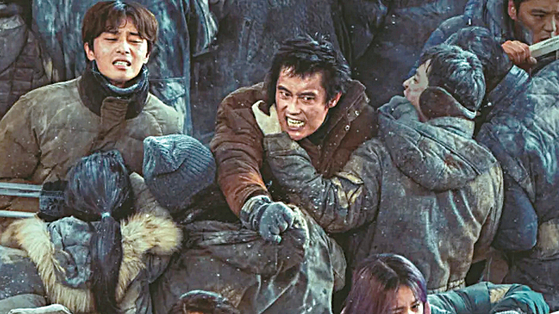

The film “Concrete Utopia” (directed by Um Tae-hwa), featuring Lee Byung-hun, has been selected as the South Korean entry for the Best International Feature at the 96th Academy Awards. This nomination is expected to showcase the production capabilities and artistry of Korean films to the world.
The awards organization will begin voting for preliminary nominees on December 18 and will announce the results on December 21. The official nominations will be announced after voting from January 11-16 next year. The awards ceremony is scheduled for March 10.
Set for release in Los Angeles on December 8, “Concrete Utopia” depicts the conflicts of characters with differing beliefs and desires in a world devastated by a major earthquake. The only survivors are the residents of Hwang Gung, a low-income apartment building.
In the movie, Young-tak, played by Lee Byung-hun, is the leader who struggles to protect the apartment from danger. His obsession with home extends beyond the simple need for safety and comfort. Through the multifaceted character of Young-tak, Lee Byung-hun brilliantly conveys inner conflict, the meaning of life, sacrifice, and ideals. His performance, blending madness and sincerity, is expected to profoundly impact the audience.
– You are known for being very good at choosing films and dramas. Do you have any specific criteria when it comes to choosing?
“I don’t have any set beliefs or criteria for selecting works. I tend to follow the feeling or interest I get when I first read the script. That’s my biggest reference point. The most important thing is to choose a movie that I enjoy. Different genres are popular at different times. When melodrama is trending, cinemas are filled with melodramas for a decade. However, this movie was a black comedy, a genre I hadn’t seen in a while. When I read the script, I suddenly realized, ‘I used to really like black comedies.'”
– Was there anything special you considered when acting as Young-tak?
“I think I spent four or five months trying to immerse myself in the situation, emotions, and environment Young-tak was in. I really tried to blend into the character until the end of the movie.”
– Did you make any changes in your daily life to prepare for the movie?
“While shooting the movie, I was with my family, doing other things, laughing and joking with friends, but Young-tak was always subconsciously in the back of my mind. I think the movie and the characters are always with me.”
– What would you do if you were in that situation in real life?
“I had many discussions with actors and directors about this while greeting people on stage. Even then, I said I had no idea. I don’t think I can answer that until I’ve actually been in such a situation and lived through it, so I keep asking myself, what would I have done?”
– What does ‘home’ mean to Young-tak in the movie?
“In Korea, the dream of ‘owning a house’ seems to be more prominent than in other countries. I think every family’s dream is to have a home for their family. For Young-tak, ‘home’ represents a family’s responsibility and dream.”
– What does ‘home’ mean to you?
“Rest. For me, home is a place where I can rest. Home should be a place where you want to relax.”
– How did audiences react to the film at the Toronto International Film Festival?
“I first saw the reaction of other ethnic groups at the Toronto International Film Festival, and it was better than I thought it would be. I was actually worried, ‘What if they don’t understand this movie?’ But I realized that everyone shares the same feelings about protecting their home.”
BY HAEUN CHUNG, JUNHAN PARK [chung.haeun@koreadaily.com]




